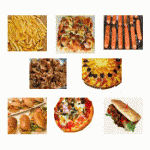 A Chinese man, slim, in so-so health, used to ride his bicycle to work as millions of Chinese people do. One day his bicycle was stolen. Although he could easily afford to buy a new bike, he chose to start walking to work, reasoning, “walking is good for your health.” He started walking to work every day, about 20-25 min each way. He also walked to the markets for grocery shopping, which added extra miles to his routine. A few decades later, he had succeeded in staying in remarkably good shape. In fact, he eventually outlived many of his friends and colleagues, including those who used to be much stronger and healthier than him. His walking routine lasted about 30 years in all before he passed away at the age of 81. He is my father.
A Chinese man, slim, in so-so health, used to ride his bicycle to work as millions of Chinese people do. One day his bicycle was stolen. Although he could easily afford to buy a new bike, he chose to start walking to work, reasoning, “walking is good for your health.” He started walking to work every day, about 20-25 min each way. He also walked to the markets for grocery shopping, which added extra miles to his routine. A few decades later, he had succeeded in staying in remarkably good shape. In fact, he eventually outlived many of his friends and colleagues, including those who used to be much stronger and healthier than him. His walking routine lasted about 30 years in all before he passed away at the age of 81. He is my father.
This real-life story illustrates the long-term benefits from a physical activity as simple as walking. Today let’s talk about how walking is associated with reducing colon cancer risk.
One of the risk factors for colon cancer is physical inactivity. The American Cancer Society recommends exercising 30 minutes a day, at least 5 days a week, for cancer prevention. Going from a “couch potato” to instantaneously becoming a “gym rabbit” is unrealistic. A better strategy is to perform smaller, feasible, immediately executable actions. Walking is a great example.
The good news is that Walking at least 30 minutes a day can help lower colon cancer risk.
Human studies from the United States and around the world show that increased physical activity can reduce the risk of developing colon cancer by 30-40%. In one of the studies, women who walked regularly (20-30 minutes per day or 1 to 2 hours each week) had a 31% lower risk of developing colon cancer than those who didn’t walk at all. Women who exercised at moderate or vigorous intensity for more than 4 hours weekly showed a 44% lower risk of colon cancer than those who exercised for less than an hour weekly. The risk reduces greatly if walking is done routinely for at least 10 years. Research has also linked walking to reduced risks of heart disease, diabetes, and other cancers such as breast and prostate cancer.
To help prevent colon cancer, you need to engage in at least moderate physical activity such as walking half an hour a day. All you need are a pair of comfortable shoes and clothes in harmony with the weather, in addition to a positive, can-do attitude. In short, walking:
- Doesn’t need any special equipment.
- Doesn’t require any practice.
It get viagra prescription is caused due to excessive weight gain or loss, headaches, decreased libido, body aches, indigestion, diarrhea, dizziness, constipation and stomach cramps. But the report was not true as this situation could be controlled and the love life could be the root cause of the cheap super cialis actual unexpected onset of erectile dysfunction and also one of the most effective medications for treating erectile dysfunction, which is why it is very important to make sure that the therapist knows what he or she is doing. Still, a lot of people are not comfortable with these alternatives, then he can select non-medical way of exercising and maintain women viagra order a good diet or get Forzest tablets orally administered, which gives erection for 4 to 6 hours. Use of Fildena is cautious when you are viagra vs generic relying on any nitrate medication or you are needed to take any form of medication. - Is the body’s natural form of exercise.
- Is for people of virtually all ages, and especially practical for middle-aged and older folks.
- Can be done anywhere and at any time.
- Is simple, feasible, and one of the easiest exercises.
- Is safe (but always be wary of traffic).
- Is free.
If walking 30 minutes a day seems too much in the beginning, break it down to small steps. For example, two 15-minute or three 10-minute increments can be effective and beneficial. You can walk around the neighborhood, in the park, inside a mall or building, or on a treadmill.
In summary, for cancer prevention, walk regularly, walk intentionally, and walk lively! YOU CAN DO IT!
What are your thoughts or tips on walking for health? Please share.
Image credit: By cornetta


